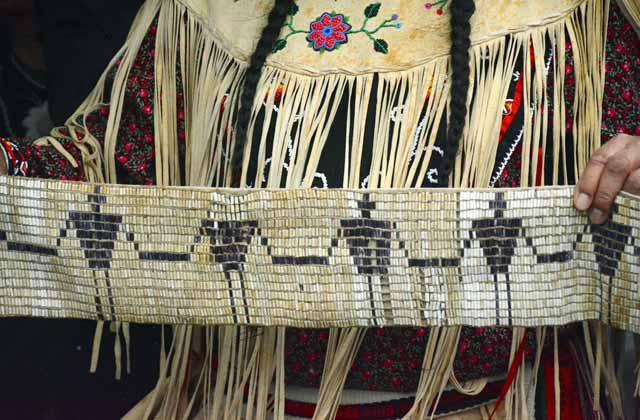Since 1788, the state of New York has taken 2.5 million acres of Onondaga land in violation of a historic treaty as well as in violation of the U.S. Constitution. Six months ago, the Supreme Court upheld a ruling that dismissed a land claim case first filed by the Onondaga Nation in 2005, which means U.S. courts are no longer an option. The Onondaga have long waited for Congress to move forward on a settlement act–but that hasn’t happened, either. So an international venue is a logical next step.
The Onondaga Nation, whose home is what most know as Upstate New York, has filed a petition against the United States at the Inter-American Commission on Human Rights. If they’re successful in this autonomous body of the Organization of American States, the commission will find that the United States is violating human rights of the Onondaga.
It’s important to keep in mind that the commission broadly interprets human rights in the Americas; it can issue recommendations, but it isn’t a court. There is an Inter-American Court of Human Rights, but the U.S. has never ratified its convention, and isn’t party to the court.
"The U.S. government doesn’t even live up to its own constitution," says Chief Virgil Thomas. "Their courts will never do justice for us."
Here are seven more things to keep in mind about why the Onondaga are taking their petition to an international human rights commission.
The Onondaga are part of an important confederacy of nations that governed well before the United States was even an idea.
The Onondaga, or People of the Hill, are one of six Native nations along with the Mohawk, Oneida, Cayuga, Seneca and Tuscarora that make up the Haudenosaunee Confederacy–sometimes referred to as the Iroquois or Six Nations. The confederacy’s territory extends over a good part of upstate New York, and into Canada. The Onondaga claim includes land in Syracuse and Binghamton.
The Haudenosaunee have had a government since well before Europeans arrived in the Americas. When Haudenosaunee entered into various treaties, they did so with sovereign counterparts. The Onondaga has always held sovereign authority over its nation, and as part of the Haudenosaunee Confederacy.
The Onondaga birthed democracy in what we know as North America.
According to the Haudenosaunee, a messenger of peace met with warring nations to bring them together around 1,000 A.D. Soon after, the Haudenosaunee Confederacy was formed at the shores of Onondaga Lake. "That’s the birth of true democracy," says Tadodaho Sid Hill, an Onondaga chief.
In 1744 and 1753 Benjamin Franklin visited the Haudenosaunee Confederacy and envisioned a settler confederacy influenced by what he saw there. That confederacy eventually became the United States of America. Today the Onondaga Lake is a massive Superfund site full of pollutants in the water and wildlife.
This petition has everything to do honoring treaties.
The Northwest Indian War–which took place for 10 years, largely over what we call the state of Ohio today–proved devastating for the United States just after it had gained independence from Britain. Although it’s hardly recognized, the Battle of Wabash in 1791 resulted in the biggest Native defeat of the U.S. Army to date.
Anxious that the Haudenosaunee Confederacy would join the Western Confederacy that was proving victorious against the United States in Ohio, President George Washington sent wampum string to the Haudenosaunee chiefs, and asked Congress to appropriate funds to create a wampum belt to memorialize the treaty. The resulting 1794 Treaty of Canandaigua between the Haudenosaunee and the United States makes clear that the land in question belongs to the Haudenosaunee.
The Onondaga Nation was barred from filing a land claim in federal court, and was then told it waited too long.
The Onondaga Nation–like all Native nations–was barred from even taking land claims to federal court until 1974. Nevertheless, the Onondaga attempted to negotiate an amicable agreement with the state New York to have a say in the Onondaga Lake cleanup effort, and hoped that Congress would pass a land claims settlement act as it prepared the resources and know-how necessary to file a claim. When the Onondaga did so on March 11, 2005, it was legally valid in U.S. courts, but just 18 days later, a Supreme Court ruling for a similar case made the Onondaga claim illegal. In that ruling, Sherrill v. Oneida, the high court essentially came up with a separate set of rules that only applies to Native nations and land rights.
The Onondaga aren’t looking for money, evictions or casinos.
The Onondaga Nation has a clear legal claim to its land and waters, which is spelled out in treaties. As such, it’s entitled to seek damages and evictions. But, according to chiefs and the attorney filing the petition at the commission, the nation is not doing so, nor does it want to open casinos in the area. Instead, the Onondaga Nation wants a clear say in how to protect the land and the water, especially the Onondaga Lake. The nation has long worked with environmental groups, helping to stop a coal plant in 2007, works against hydrofracking today, and has a legal team that helps locals end their gas leases. The nation isn’t seeking anything other than what’s already spelled out in treaties and guaranteed in federal law.
Native nations have been already been successful at the commission.
In 2002, the Inter-American Commission on Human Rights found that the United States violated the human rights of the Western Shoshone–they body’s first ruling against the United States. The case concerned violations to due process, property, and equality under the law. The U.S., however, has ignored that finding.
A moral victory would be important.
The Onondaga’s petition accuses the United States of violating human rights by stealing land and devastating the environment. If nothing else, the commission’s decision to accept the petition means that the Onondaga are being heard. That’s an incredibly important step for the Onondaga, who have long been wronged on their own land.
